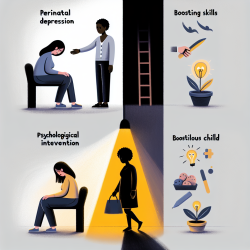In the realm of child and adolescent psychiatry, the journey of Dr. Olayinka Atilola, as chronicled in the research article "Forging a career as a child and adolescent psychiatry researcher in Nigeria: Surmounting challenges and taking opportunities," provides invaluable insights and practical strategies for practitioners aiming to enhance their skills and improve outcomes for children.
Dr. Atilola's experience underscores the importance of addressing the unique challenges faced by low- and middle-income countries (LMICs) in the field of child and adolescent psychiatry (CAP). Despite limited resources and systemic hurdles, Dr. Atilola's innovative approaches and collaborative efforts have led to significant advancements in CAP services and research in Nigeria.
Key Takeaways for Practitioners
Practitioners can draw several lessons from Dr. Atilola's work to improve their skills and contribute to the field:
- Embrace Collaborative Platforms: Establishing and participating in collaborative networks, such as the International Child Mental Health Study Group (ICMH-SG), can facilitate peer mentoring, knowledge sharing, and joint research initiatives. These platforms can help bridge the evidence gap and enhance the quality of CAP services in LMICs.
- Focus on Task-Shifting: Training non-specialist personnel, such as school teachers and laypersons, to conduct basic neurodevelopmental surveillance can significantly improve early detection and intervention for children with developmental disorders. This approach leverages existing resources and expands the reach of mental health services.
- Advocate for Systemic Change: Advocacy efforts are crucial in addressing systemic barriers and improving access to essential interventions, such as behavior and speech therapy. Practitioners should engage in continuous advocacy to influence policy changes and resource allocation.
- Innovate in Service Delivery: Developing multidisciplinary teams and creating outreach programs for underserved populations, such as justice-involved adolescents, can provide comprehensive mental health services to those in need. These initiatives require creativity and a commitment to addressing gaps in the current system.
Encouraging Further Research
Dr. Atilola's journey also highlights the need for ongoing research to inform and improve CAP practices. Practitioners are encouraged to:
- Engage in Cross-Cultural Research: Conducting studies that examine the validity and reliability of commonly used instruments across different cultural contexts can enhance the accuracy and applicability of assessment tools in diverse settings.
- Seek Funding Opportunities: Despite the challenges in securing research funding, practitioners should actively seek grants and funding opportunities, both locally and internationally, to support their research endeavors.
- Build Research Capacity: Investing in training and mentorship programs for young researchers can help build a robust pipeline of skilled professionals dedicated to advancing CAP research in LMICs.
By implementing these strategies and embracing a data-driven approach, practitioners can make significant strides in improving mental health outcomes for children and adolescents in LMICs. Dr. Atilola's work serves as a testament to the power of resilience, innovation, and collaboration in overcoming challenges and driving positive change in the field of child psychiatry.
To read the original research paper, please follow this link: Forging a career as a child and adolescent psychiatry researcher in Nigeria: Surmounting challenges and taking opportunities.










